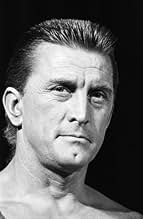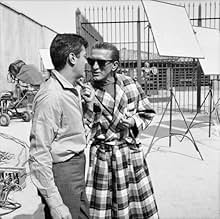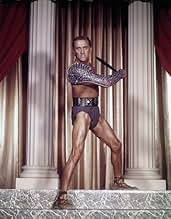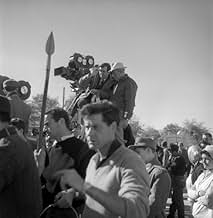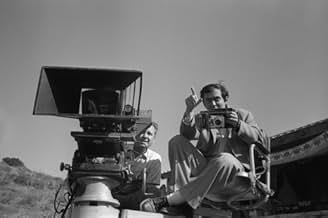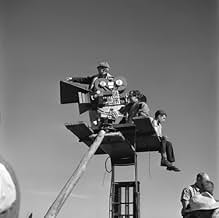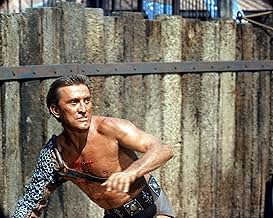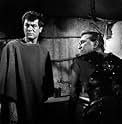गुलाम स्पार्टाकस पतनशील रोमन गणराज्य के खिलाफ एक हिंसक विद्रोह का नेतृत्व करता है.गुलाम स्पार्टाकस पतनशील रोमन गणराज्य के खिलाफ एक हिंसक विद्रोह का नेतृत्व करता है.गुलाम स्पार्टाकस पतनशील रोमन गणराज्य के खिलाफ एक हिंसक विद्रोह का नेतृत्व करता है.
- 4 ऑस्कर जीते
- 12 जीत और कुल 11 नामांकन
सारांश
Reviewers say 'Spartacus' is lauded for its epic scale, historical drama, and standout performances by Kirk Douglas, Laurence Olivier, and Peter Ustinov. Key themes include the fight for freedom, class conflict, and human resilience. However, some criticize historical inaccuracies, pacing, and the film's length. Love scenes and certain character arcs receive mixed feedback. Despite these issues, the film's spectacle, cinematography, and ensemble cast performances are widely appreciated.
फ़ीचर्ड समीक्षाएं
This is Kubrick's farewell to Hollywood. I would have liked to be a fly on the wall. I don't believe for a minute that it was a cordial parting of the ways. I mean, Kubrick never returned, never! With "Paths of Glory" Kubrick gave Kirk Douglas, not just his best part as an actor, but his best movie. By the time Douglas called Kubrick to "take over" "Spartacus" Douglas was already a huge star with too much saying in the matter. Look at it, it's clear. "Spartacus" is more Douglas than Kubrick. Great fun to watch, yes, absolutely. A terrific script by black listed Dalton Trumbo. Some fight sequences unequalled in the history of film. Look at the fight between Douglas and Woody Strode and compare it to the ones in "Troy" or "Gladiator" for that matter. It is sad an embarrassing to realise how low we've fallen. Computer generated images or not. The cast is unbelievable but it's clearly not Kubrick's. The casting of his movies was part of his master plan. He would cast a Ryan O'Neil as Barry Lyndon for instance so he can blend perfectly with the magnificent tapestry, without adding any colours of his own. The same can be said of Keir Dullea, in 2001, a robotic non entity in a showdown with a voice. When he needed actors to be at the very pinnacle of his universe he went to Peter Sellers, Malcolm McDowell or James Mason. Even the casting of Tom Cruise made a lot of sense. He used the star and his wife to talk about the dreamlike powers of betrayal. In "Spartacus" Tony Curtis, plays Antoninus, a teacher of the classics. A campy idea never seen in a Kubrick film, before or since. To be fair, there are some spot on, brilliant pieces of casting. Charles Laughton is, as usual, superb. Peter Ustinov, terrific. Laurence Olivier manages to give a multifaceted portrait of weakness, fear and greed. Jean Simmons makes the reason to survive totally believable. But the cutesy love scene between her and a shiny muscular, coiffed Spartacus is truly terrible. As a final blow, the scene is enveloped in a sticky, corny music theme. Having said all that. Don't you dare missing this epic. I'ts Kubrick's goodbye to Hollywood and like everything else that the master said or do, he really meant it.
It is very much part of Hollywood folklore that having dispensed with the services of Anthony Mann, producer and star Kirk Douglas brought in Stanley Kubrick with whom he had worked so effectively in 'Paths of Glory'. This represented a daunting challenge and Kubrick passed with flying colours. The rest as they say is history although Douglas always felt that Kubrick was not as grateful as he should have been!
It would be well-nigh impossible now to assemble a cast of such substance and quality. There were bound to be clashes of temperament of course and the animosity between Olivier and Laughton has been amusingly recounted by Peter Ustinov who picked up an Oscar as Best Supporting actor. Olivier here is in his physical prime and is magnificent in the role of Crassus. He is ruthlessness incarnate but tender in his scenes with the Lavinia of Jean Simmons. He had previously directed her in 'Hamlet' and their professional bond is palpable.
There are scenes which are indelibly etched notably the gladiatorial combat between Douglas and Woody Strode and the scene where the slave army watches the legions of Crassus forming for battle which must surely have been inspired by Eisenstein's 'Alexander Nevsky'. The score by Alex North although harsh captures perfectly the brutality of the times whilst Russell Metty's cinematography is outstanding.
Forget the others, this is the only gladiator film that really matters and it will never be surpassed.
It would be well-nigh impossible now to assemble a cast of such substance and quality. There were bound to be clashes of temperament of course and the animosity between Olivier and Laughton has been amusingly recounted by Peter Ustinov who picked up an Oscar as Best Supporting actor. Olivier here is in his physical prime and is magnificent in the role of Crassus. He is ruthlessness incarnate but tender in his scenes with the Lavinia of Jean Simmons. He had previously directed her in 'Hamlet' and their professional bond is palpable.
There are scenes which are indelibly etched notably the gladiatorial combat between Douglas and Woody Strode and the scene where the slave army watches the legions of Crassus forming for battle which must surely have been inspired by Eisenstein's 'Alexander Nevsky'. The score by Alex North although harsh captures perfectly the brutality of the times whilst Russell Metty's cinematography is outstanding.
Forget the others, this is the only gladiator film that really matters and it will never be surpassed.
Spartacus (1960) was a director for hire gig for Stanley Kubrick. Kirk Douglas was in a pinch for his next film project. He was making an epic film about a slave in the roman republic who rebels against his masters. Anthony Mann stepped down from the director's chair and Mr. Douglas needed someone to take over. Enters Stanley Kubrick. Although he has little creative input (i.e. script and story wise) he manages to make a compelling movie with his keen eye and directorial abilities.
Filmed in a grand scope and in such great detail, Spartacus is eye candy for fans of epic film making. I can only imagine what the film would have been like if he had total control over the project. Kirk Douglas is the man as Spartacus, Tony Curtis is quite good as his sidekick, Charles Laughton is wise and witty as the elder senator, Peter Ustinov is a hoot in his role as the poor victim of fortunate (and unfortunate) circumstance and Sir Laurence Olivier shows why he was the premier actor of his day as Crassus.
Highly recommended for Kirk Douglas fans and Stanley Kubrick philes.
Filmed in a grand scope and in such great detail, Spartacus is eye candy for fans of epic film making. I can only imagine what the film would have been like if he had total control over the project. Kirk Douglas is the man as Spartacus, Tony Curtis is quite good as his sidekick, Charles Laughton is wise and witty as the elder senator, Peter Ustinov is a hoot in his role as the poor victim of fortunate (and unfortunate) circumstance and Sir Laurence Olivier shows why he was the premier actor of his day as Crassus.
Highly recommended for Kirk Douglas fans and Stanley Kubrick philes.
10bb_org
A very moving and compelling story of epic proportions. The plot is relentless, propelled by a dazzling screenplay. Kubrick draws some of the greatest performances of the cast, and fills the screen with images that fascinate throughout. Well paced for a movie of this magnitude.
To those who complain of anachronisms and poetic license with historical events, I say to them, 'Remember, it is a movie.' To be truly accurate, the cast would be delivering their lines in Latin and ancient Greek, with English subtitles. Whatever Kubrick might lose with historical inaccuracies, he gains far more in his ability to convey the story to the viewer. Even though it is over forty years old, the film tells us more of the present day than it does of the past.
To those who complain of anachronisms and poetic license with historical events, I say to them, 'Remember, it is a movie.' To be truly accurate, the cast would be delivering their lines in Latin and ancient Greek, with English subtitles. Whatever Kubrick might lose with historical inaccuracies, he gains far more in his ability to convey the story to the viewer. Even though it is over forty years old, the film tells us more of the present day than it does of the past.
"Spartacus" is an epic tale of rebellion and freedom, set against the backdrop of ancient Rome. Kirk Douglas delivers a powerful performance as Spartacus, a Thracian slave who leads a revolt against the oppressive Roman Empire. Directed by Stanley Kubrick, the film is a sweeping epic that combines thrilling action with deep emotional resonance. The supporting cast, including Laurence Olivier as the formidable General Crassus and Peter Ustinov as the scheming Batiatus, adds layers of complexity to the story. The film's themes of freedom, justice, and the struggle against tyranny resonate strongly, making "Spartacus" not just a gripping historical drama, but also a timeless exploration of the human spirit.
क्या आपको पता है
- ट्रिवियाStanley Kubrick was brought in as director after Kirk Douglas had a major falling out with the original director, Anthony Mann. According to Sir Peter Ustinov, the salt mines sequence was the only footage shot by Mann.
- गूफ़A truck drives along the hills behind a battle scene.
- भाव
Herald: I bring a message from your master, Marcus Licinius Crassus, Commander of Italy. By command of His Most Merciful Excellency, your lives are to be spared. Slaves you were and slaves you remain. But the terrible penalty of crucifixion has been set aside on the single condition that you identify the body or the living person of the slave called Spartacus.
Antoninus: [stands up] I'm Spartacus!
[everyone around Antoninus and Spartacus stands up and shouts "I'm Spartacus!"]
- क्रेज़ी क्रेडिटThe six main cast members are accompanied by an item that represents their character (a chain, a Roman eagle, a wine jug, a couple of hands - one wielding a snake, and a sword).
- इसके अलावा अन्य वर्जनAfter its premiere the film was heavily cut and wasn't shown in its complete form until 1991, when a restored version was re-released. Among the restored scenes is one where where Marcus Crassus (Laurence Olivier) tries to seduce Antonius (Tony Curtis) in the bath. The soundtrack was damaged, so Anthony Hopkins was called in to dub Olivier's lines. In addition, several scenes of violence preview audiences reacted to negatively were restored, including Crassus bloodily stabbing Draba, Marcellus being drowned in the stew, Spartacus stabbing a Roman soldier in the pool, and several gory shots in the final battle, notably Spartacus lopping off the arm of a Roman soldier.
- कनेक्शनEdited into Hercules: The Legendary Journeys: Les Contemptibles (1997)
टॉप पसंद
रेटिंग देने के लिए साइन-इन करें और वैयक्तिकृत सुझावों के लिए वॉचलिस्ट करें
विवरण
- रिलीज़ की तारीख़
- कंट्री ऑफ़ ओरिजिन
- आधिकारिक साइट
- भाषा
- इस रूप में भी जाना जाता है
- Espartaco
- फ़िल्माने की जगहें
- Hearst Castle, San Simeon, कैलिफोर्निया, संयुक्त राज्य अमेरिका(Crassus' villa)
- उत्पादन कंपनी
- IMDbPro पर और कंपनी क्रेडिट देखें
बॉक्स ऑफ़िस
- बजट
- $1,20,00,000(अनुमानित)
- US और कनाडा में सकल
- $18,30,650
- US और कनाडा में पहले सप्ताह में कुल कमाई
- $92,162
- 28 अप्रैल 1991
- दुनिया भर में सकल
- $18,55,491
- चलने की अवधि3 घंटे 17 मिनट
- रंग
इस पेज में योगदान दें
किसी बदलाव का सुझाव दें या अनुपलब्ध कॉन्टेंट जोड़ें





